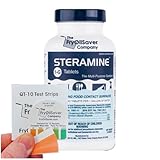Today, we'll embark on a meticulous examination of how to purify water in the wild, drawing upon extensive research and evidence-backed methodologies.
1. Source Selection
First, we need to find water. We are looking for moving water, like streams or rivers, which is typically cleaner than stagnant sources such as ponds or lakes, due to the natural filtration processes that occurs in moving bodies of water.
My tips:
- Look for flowing sources, such as brooks, streams, or rivers.
- Avoid water from downstream where human or animal activity is prominent. Yeah.... poop and feces.
- Clearer water is preferable as it requires less filtration and purification effort.
Really good source: EPA - Understanding the Source of Drinking Water
2. Filtration
We need to clean this water 🙂
A few tips:
- Use a clean cloth, bandana, or shirt. Pour the water through it into another container. This will catch large sediments and particulate matter. Seriously. This works.
- Coffee filters or paper towels can serve in a pinch.
- Commercially available portable filters can be used for a more thorough filtration.
- Removes Bacteria & Parasites: The Microfiltration Membrane Removes...
- Removes Microplastics: Removes The Smallest Microplastics Found In The...
- Rigorous Testing: All Claims Are Verified With Laboratories Using Standard...
- Survival Gear for Outdoor Water Needs - SGS certificated, Test Report...
- Portable & Long Life-Span - This straw filtration at only 7.1'' long and 1"...
- 5-Stage Filtration - Our Upgrade 5-Stage Filtration System includes a...
Source: CDC - Household Water Treatment
3. Boiling
For a really detailed overview, check out my overview on how to boil water when camping
A quick summary of tips:
- Collect filtered water in a container.
- Bring the water to a rolling boil.
- Continue boiling for at least one minute. If you're at an altitude above 2,000 meters, boil for three minutes.
- Let the water cool naturally before consuming.
4. Solar Disinfection (SODIS)
We can harness the power of the sun and have Ultraviolet (UV) rays kill harmful pathogens.
Some quick tips
- Fill a clear plastic bottle with filtered water.
- Place the bottle on a reflective surface under direct sunlight.
- Leave the bottle for at least 6 hours. In cloudy weather, leave it for two consecutive days.
Source: SODIS - Solar Water Disinfection
5. Chemical Disinfection
Chemicals can be used to kill harmful pathogens.
Steps:
- Filter the water to remove large contaminants.
- Follow the instructions on the chemical disinfection tablets or drops. Typically, you'll add a specific number of tablets or drops to a defined quantity of water.
- Wait for the recommended period, usually 30 minutes, before drinking.
Source: CDC - Chemical Water Disinfection
- CONCENTRATED SANITIZER TABLETS - Steramine 1-G Quaternary Tablets...
- SANITIZES food contact surfaces and equipment in restaurants, bars, daycare...
- Premeasured and EASY TO USE. Use 1 tablet per 1 gallon of water. Visible...
- STERAMINE SANITIZING TABLETS - Each bottle contains 150 concentrated...
- SANITIZER TABLETS - Designed to effectively sanitize food contact surfaces...
- EASY TO USE & EFFECTIVE - Steramine sanitizing tablets provide a...
6. Distillation
This can be an effective method against chemically contaminated sources.
Best tips:
- Set up a system where water is boiled, and the steam is captured and condensed.
- Use a pot with a lid and a cup. Fill the pot partly with water and place the cup in the center.
- Cover the pot with the lid upside down, so the highest point of the lid is pointing downwards.
- As the water boils, steam will condense on the lid and drip into the cup.
- Ensure the water in the cup doesn't mix with the boiling water.
Source: USGS - The Water Cycle: Distillation
The significance of potable water can't be overstated. Equipping oneself with the necessary skills to transform natural water sources into safe drinking water is paramount. These detailed methodologies ensure not just survival, but a safeguarding against waterborne ailments.
I am an independent safety and survival expert and consultant. I have over 15+ years of experience working with corporations and individuals to help identify, remediate and prepare for threats and and disasters. I help clients understand risks and blog about my thoughts and techniques at DisasterShelters.net
Last update on 2024-09-30 / Affiliate links / Images from Amazon Product Advertising API




